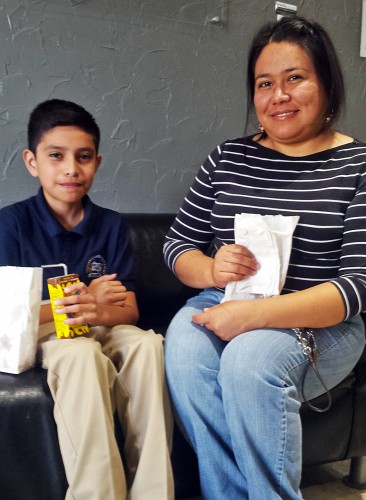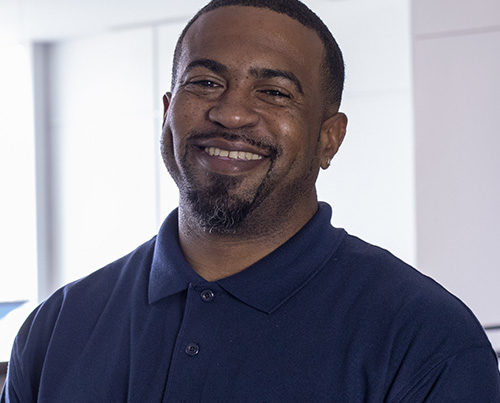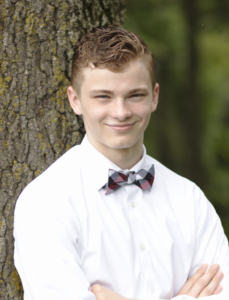As the first week of school kicked off on August 24, Maria Elena Gomez sat with her son Juan in the school entrance at Founders Classical Academy in Mesquite watching him eat his breakfast. Nearby, many parents waited in a cluster to submit enrollment paperwork and forms to the front office. Ms. Gomez and her son spoke quietly to each other in Spanish despite the noise.
Finishing his breakfast, Juan explained that he is in sixth grade and that his mother wanted to send him to a classical school, but finding one nearby was difficult. Ms. Gomez is sending Juan to the school because she wants him to receive a comprehensive and structured education of a classical school.
“I like this school and I think it provides everything my son needs. I am excited. I want him to get a full education,” she said.
Zanna Wallace chose to send her seven-year-old son Emmet to the school because she wanted him to receive a high quality, rigorous classical education from the beginning.
“We live in Mesquite and we were evaluating all of our options in this area and we were thrilled that Mesquite actually had something. I would usually think of these opportunities as further north in Dallas so I love that it is coming to our community,” said Ms. Wallace.
A former teacher herself, speaking with the headmaster gave her confidence in the school and its teachers. She appreciates the structure and curriculum of the school.
“I think he will gain critical thinking skills, a love of literature and a holistic approach to evaluating the world and his environment,” she said.
In an area where the majority of students are classified as economically disadvantaged, Responsive Education Solutions (ResponsiveEd), the largest charter school provider in north Texas, has opened two new classical charter schools. ResponsiveEd has invested over $300,000 launching the two schools in areas where on average 90% of the students are considered low income. The community has responded positively to the new choice available and the Founders Classical Academies in Dallas and Mesquite are at full capacity with waitlists.
Scott Davis, ResponsiveEd’s national director of classical schools, believes offering classical schools in the Dallas and Mesquite communities is important.
“While we know we will face new challenges, a rigorous classical education is not just for a certain group of kids. The classical education has proven itself through history, and we believe every family should have the choice available regardless of socio-economic or language background,” said Mr. Davis.
The Dallas schools in the immediate area of the Founders Classical Academy in Dallas report an average of 96% economically disadvantaged and 43% English Language Learners (ELL) in their 2013-2014 Texas Education Agency (TEA) report card. In the new Mesquite school community, the neighboring schools reported an average of 85% economically disadvantaged and 26% ELL students in their 2013-2014 TEA report card. This places both new schools in a demographic above the state and district percentages in both categories.
The Founders Classical Academies are the result of collaboration between ResponsiveEd and Hillsdale College’s Barney Charter School Initiative. Through this initiative, Hillsdale College, a liberal arts college in Michigan, supports the launch of K-12 classical schools across the country. ResponsiveEd is Hillsdale’s largest partner.
Director of the Barney Charter School Initiative Phillip Kilgore said making a classical education accessible to all families is essential to fostering responsible citizens.
“The idea is that a classical education is the kind of education needed by the citizenry of a republic if that republic is to function properly. Classics focus on what it means to be a good and educated human being, what it means to be a free person, someone who understands their liberty as well as their responsibilities,” said Mr. Kilgore.
John Heitzenrater and Shannon Nason, the headmasters at Founders Classical Academies in Mesquite and Dallas, both believe a classical education grounds students in history and a universal understanding of what it means to be human.
“Classical education is really about mastering core things that every person should know and understand. Our students also should be learning about our common tradition, whether they are a native English speaker or a Spanish speaker,” said Mr. Heitzenrater.
Dr. Nason said the curriculum is about cultural literacy, “It is not a curriculum that is catered towards any one group; it is catered towards human beings. This is the education our founding fathers envisioned for this country. It aims at the person rather than the class, regardless of you ethnicity.”
Coming from teaching at the collegiate level, Dr. Nason said he wanted to be a part of a solution to problems he discovered teaching in colleges.
“I saw students coming into their introduction to philosophy class culturally illiterate, they did not have a basic knowledge of American history or Western civilization. That made teaching very difficult because the classes I taught relied on a basic knowledge,” said Dr. Nason.
Dr. Nason and Mr. Heitzenrater spent the summer devising procedures and structures that will allow their Spanish-speaking students transition into the new schools.
Dr. Nason said there are two primary challenges that keep him up at night: helping students adjust to the rigors of classical education and the large number of students for whom English is not their first language.
Regardless of their student’s first language, Dr. Nason and Mr. Heitzenrater are determined to ensure each student receives a classical education with history, Latin, explicit Riggs phonics and the arts.
“My students have always thrived in a classical environment and I believe my students in east Dallas are no different. Whether they speak English or Spanish at home, they will benefit from the education and focused attention of our teachers,” said Mr. Heitzenrater.
Classical education also emphasizes discipline and order. While Dr. Nason has been drafting policies, he plans to be flexible as they learn what works best.
Mr. Heitzenrater said that the discipline in the school is part of forming virtuous character. “Discipline should never be demoralizing, but it should always aid in virtue. You can correct a child and show them what they have done is wrong, and then show them what virtue that should have been present,” he said.
Dr. Nason and Mr. Heitzenrater are confident that their diverse staff will aid in success of the venture. The staff is a combination of seasoned public school teachers with teachers from classical backgrounds. All of the teachers received extensive training to help them understand the purpose and background of classical education as well as practices for teaching their specific classes.
“All of them are very excited for this new venture. The idea of being part of a founding year has really excited all of my teachers. They recognize the importance of what we are doing and the challenges involved,” said Dr. Nason.
The focus of a classical education expands beyond test scores, but measuring student advancement is the important for assessing the progress of the schools. The schools will be implementing Measure of Academic Proficiency and Progress (MAPP) tests to track student advancement in key areas assessed by the STAAR test.
“While we will be using the MAPP tests to track our students’ growth, we won’t sacrifice history, science, the arts and character development. We focus on the educating the whole person and believe the statistics will follow. We hope to see this verified in our MAPP results,” said Mr. Davis.




